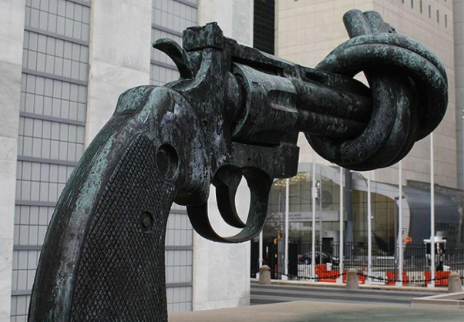CURRENT AFFAIRS UNIT, RADIO KWARA, ILORIN
PROGRAMME: NEWS COMMENTARY
DATE OF BROADCAST: 13/4/89 AT 1810 HOURS
WRITER: LANRE KAWU
Last week, Nigeria hosted an African regional conference on disarmament. At the conference, the old pious declarations on ensuring disarmament, in order to release resources for development were made. The worldwide demand of the peoples for disarmament has always been part and parcel of the international political chess game. In most cases, the various political circles, have not been sincere about genuine disarmament.
A notable move in this direction of disarmament, was however made, by Mikhail Gorbachev, during his speech at the United Nations in December, 1988. Gorbachev offered a unilateral reduction of Soviet forces by 500, 000 men, and the withdrawal of six Soviet tank divisions from Europe. The international situation today, is such that the security of nations can no longer be seen in terms of the soldiers under arms, or in the number of tanks and fighter planes countries have in their arsenals.
As the world becomes more and more interconnected, the question of security acquires an increasingly economic and moral complexion, which call for the disarmament movement to be taken more seriously, for the sake of the world’s economic development, and the preservation of life on the planet. But for a long time also, the issue of disarmament, was seen as an exclusive realm of the big powers. While countries in Africa, Asia and Latin America, faced with huge problems of underdevelopment waste colossal amounts of money in purchasing arms systems that contribute nothing to development.
According to statistics, during the 1970s, arms importation by African countries grew faster than any other region in the world. Ironically, this was the decade of the devastating Sahelian drought which left thousands of people dead and maimed. At a related level, is the serious disequilibrium that emerges when our nations make the choice of purchasing arms systems. One million dollars could provide 1,00 classrooms for 30,000 children; yet, it is the cost of a modest modern tank. The price of a single helicopter is equivalent to the salary of 12,000 school teachers. So, the policy choice of more tanks, means less classrooms, with dire consequences for economic and social development of nations.
As the economic crisis in Africa bites harder on the lean resources of our countries, the various regimes in our countries have to answer the obvious question of what they give priority to. This means we must make a choice between having well-equipped armies in societies of illiterates, undernourished children and underdeveloped national infrastructures. The thinking at the hierarchies of power in various parts of the world still seem to lag behind the reality of the nuclear age in the areas of arms production and purchases. Many of these rulers have strong links with the military-industrial complex, and make huge profits from these merchandise of death. In African countries, the armies represent legacies of the colonial systems, that have been retained, over-armed and have become the most important political institutions of these states.
Given such power and privilege that flow from the arms industry, it is no doubt difficult to win convincingly the argument for disarmament. But if the world must move forward into the 21st Century, with all the possibilities that would come with it, then the issue of disarmament must move clearly to the forefront of the international, and particularly, the African agenda. Africa’s battle against underdevelopment will not be won with tanks and jets. Africa needs steel industries, machine tool plants, schools, libraries and health centres. This is why the Lagos initiative on disarmament for development, which held last week, was such a welcome development.


